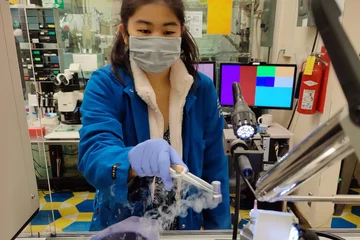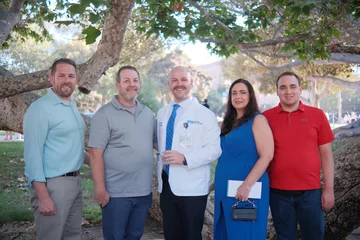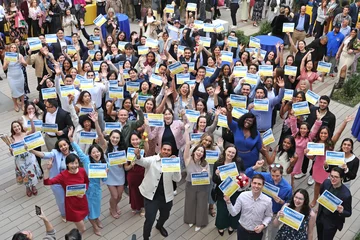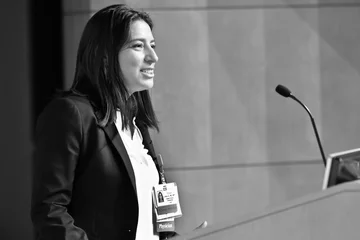Matching Into Residency: Haroon Rasheed’s Story
Student Spotlight
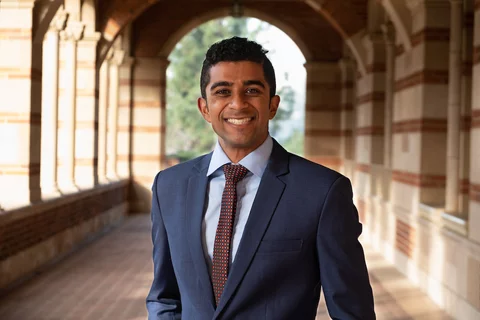
- Specialty: Ophthalmology
- Fun fact: Haroon loves hip-hop dancing and even helped direct and choreograph MDivas, the DGSOM dance team
- Matched Residency Program: University of Southern California (USC) Roski Eye Institute
Meet Haroon Rasheed
After completing his undergraduate studies in bioengineering at UCLA, Haroon Rasheed had no trouble picking his top-choice medical school: The David Geffen School of Medicine at UCLA (DGSOM).
“I knew the campus. I knew a lot of the medical students already here. I knew the quality of education—and the opportunities—UCLA offers.”
Haroon says he’ll never forget receiving his acceptance during a quick break while working at the Venice Family Clinic. Scanning his emails, his eyes darted to one from UCLA. He had a new message in the application portal.
In that moment, nothing mattered except accessing that message.
“I had to go outside and prepare myself. I opened it and immediately called my grandparents and my friends,” Haroon says. “I don't think I left the clinic until very late that night because I was just so excited.”
Selecting a Specialty
Haroon had enjoyed his undergraduate studies and hoped to find a specialty at the intersection of medicine and bioengineering.
During a resident round table (where medical students have the opportunity to speak with current UCLA interns and residents), Haroon learned about a UCLA ophthalmologist, Dr. Shawn Lin, who incorporated artificial intelligence into his work.
“That got me really excited,” Haroon says. “That was the first time I’d heard about someone in medicine using artificial intelligence.”
Haroon’s initial meeting with Dr. Lin turned into an invaluable mentorship.
“He's an absolute gem of a mentor,” Haroon says. “It has been so helpful over these past few years to shadow him, to see the impact he has on patients, and to see how much his patients appreciate the care he provides.”
Learning from Dr. Lin while working at various hospitals and centers turned Haroon’s initial curiosity about ophthalmology into conviction. He’d found his specialty—his calling.
“The work is meaningful to me and to the patients. I can have a high impact,” he says. “Giving someone's vision back is something that affects them every moment of their lives.”
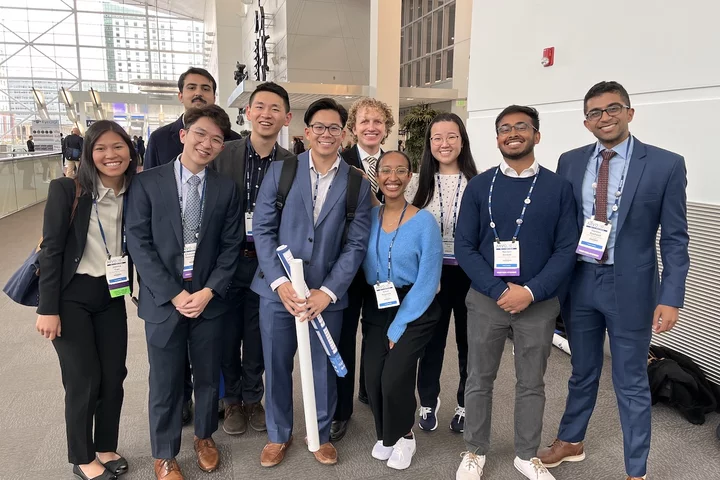
A Day in the Life of a Med Student: Preparing for Residency Interviews
While waiting for residency interviews, Haroon felt a mix of nervousness and excitement. Most of all, he felt ready to take his next steps, thanks in part to his mentors: Dr. Joseph Caprioli, Dr. Gary Holland, Dr. Shawn Lin, and Dr. Edmund Tsui.
“Whether it was preparing my application, conducting research, advising me on recommendation letter selection, or helping me rank schools—they were there for all of it. I couldn't have done it without them.”
His interview preparation process involved a lot of reading: Reading about the schools and the programs, reading about the people he would be interviewing with, and reading through (again and again) his resume to make sure everything was up-to-date and impactful.
Apart from all the reading, he favored relaxation as an overarching strategy.
“I tried not to get too stressed out, because at that point in the process, there was nothing I could do to drastically shift how I perform beyond knowing my history and what I could offer the program. It was important to me to take care of myself while waiting for the next step.”
Actually relaxing proved challenging in a time fraught with nerves and stress, but Haroon stayed present by spending quality time with friends. He also found it helpful to keep the big picture in mind.
“Where I go for residency doesn't determine how good of a doctor I'm going to be, or how good of a medical student I am.”
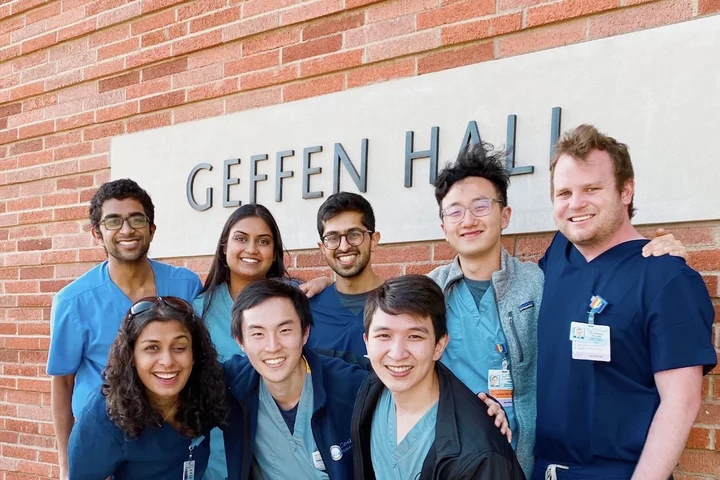
Completing the Last Rotations of Medical School
Like many medical students nearing the end of their tenure at school, Haroon started experiencing burnout.
His last rotation, at a cardiac intensive care unit (ICU), pulled him out of it. He worked on a team that prevented patients from passing away, and sometimes, revived patients who had.
The experiences reminded him why he’d been working so hard: To be able to save lives.
“I’m doing this so I can see patients come back, and so I can see the family members celebrate.”
Looking Back: Memorable Med-School Moments
Waiting for Match Day, when medical students across the United States learn where they match for residency, Haroon thought about all the connections he’d made with classmates, mentors, and faculty members.
“UCLA lived up to all my expectations. It's a wonderful school, and I think the people are the strongest part. You're not going to find a more diverse and more accomplished group of people anywhere else.”
He also reflects on being part of a small research team that built an artificial intelligence (AI) model for grading and diagnosing glaucoma.
“Glaucoma is increased pressure in the eye,” he says. “The end result is vision loss, but because it progresses so slowly, many people don’t realize they have it, which makes treatment a challenge.”
Haroon and his team worked hard on the model for several years, and eventually, it could diagnose and grade glaucoma as well as the human specialists they trained it against.
“They were almost on par with each other, which is a huge improvement. It was enormously rewarding to see all that come to fruition.”
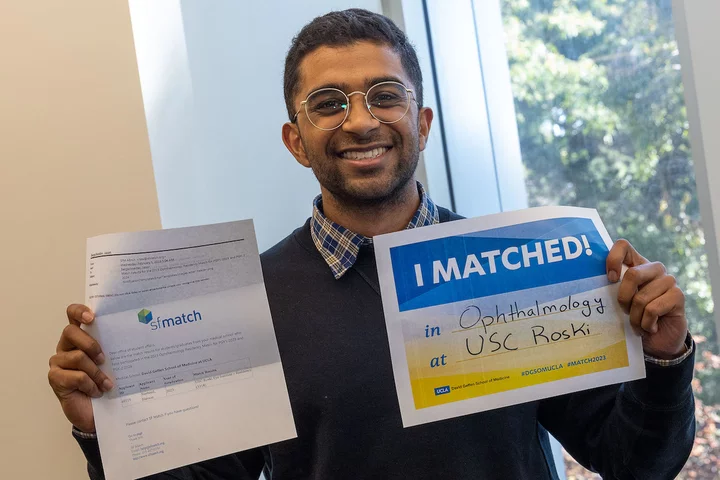
Looking Forward: Future Goals and Career Aspirations
Haroon matched into an ophthalmology residency program at the University of Southern California (USC) Roski Eye Institute.
“USC has a strong clinical and surgical training paired with a broad and diverse underserved patient population,” Haroon says. “The residency program also uniquely cultivates a very strong relationship between residents, faculty, fellows, and interns. I fully expect residency to be challenging and I pride myself on thriving in difficult environments. However, I strongly believe that hard work is made easier in an environment of camaraderie and collegiality. At USC, I hope to leave residency not only with world-class skills but also with life-long friends and mentors in ophthalmology.”
Throughout residency and beyond, Haroon plans to continue incorporating his bioengineering and artificial intelligence knowledge into his practice and research.
“I think health tech and AI is going to be a huge chapter in the next, maybe fifty to sixty years. That's where I see my career heading: Trying to bridge that gap between physicians and technologists, between engineers and computers.”
